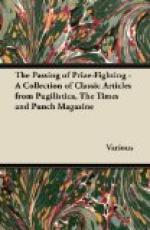As we assembled on board for the last time, awaiting our railway warrants, there were some moving spectacles. The Mate and the Second-Engineer were bidding each other affectionate and tearful farewells behind the winch. “You won’t quite forget me, Bill, will yer?” I heard the Second exclaim brokenly, but the only reply was a strangled sob. The Steward, seated on his kit-bag, was murmuring a snatch of song that asserted the rather personal fact that “our gel’s a big plump lass.” He is an oyster-dredger in civil life and is eagerly looking forward to experiencing once more the delicate thrills and excitement of this hazardous sport. Jones, our Signaller, who recently wrote a poem which opened with the lines,
“I for one will be surprised
When we are demobilised,”
was struggling painfully to insert a pair of boots into a recalcitrant kit-bag, and exhibited an expression of dogged determination rather than the astonishment he had predicted. The Trimmer was heard complaining mournfully that when he left the Patrol Office for the last time they never said good-bye. He seemed to feel this keenly.
All of us were more or less excited, all as it were on tip-toe with expectancy, like school-boys on breaking-up morning. All, did I say? No, there was one member of the crew who sat supremely indifferent to the prevailing atmosphere of emotion, gazing calmly before him with his solitary lacklustre eye. The Silent Menace, the ship’s dog, betrayed none of our childlike sentiment. Demobilisation was nothing to him—he was too old a campaigner to let a little matter like that agitate his habitual reserve. To us the recent period of hostilities had been “The War,” the only war in which we had ever been privileged to fight; but to him it was just one of the numberless affrays of an adventurous life, and, judging by the worn condition of his ears and the veteran scars that tattooed his tail, some of the previous ones had had their share of frightfulness. And to-morrow, no doubt, he will try the game again.
It was the Third Hand who suddenly propounded the unsolvable question: “Who’s goin’ to keep that there Menace?”
There was an almost universal chorus of “Me!” I say “almost universal” because Jones, who is R.N.V.R. and educated, probably said, “I,” and the Chief Engineer was lighting his pipe and merely succeeded in blowing the match out.
“You can’t all have him,” said the Third Hand, “so I think I’ll take him along with me. I knows a bit about dawgs.”
There was instant and clamant disapproval, each one of us urging an unquestionable claim to the guardianship of the orphan Menace. The Steward said he was the only one with the ghost of a right to the dog; had it not always been the Menace’s custom to help him wash up the plates and dishes? A Deck Hand, however, protested that as he had eaten one of his mittens the Silent Menace was already in part his property. The Mate and the Second-Engineer nearly came to blows about it.




